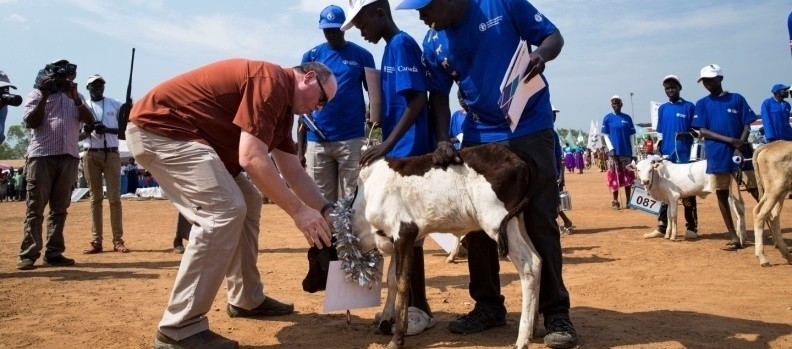A two-day livestock show and agricultural exhibition to promote animal production and food security was organized in Torit town of South Sudan’s Torit State.
The event that was held from 14 to 15 January brought together livestock owners rearing cattle, goats and sheep to compete on the basis of good husbandry and other cultural aspects displayed by their animals in the race. The crops farmers also exhibited their produces during the show.
The two-day show was organized by the United States Agency for International Development (USAID) and the Food and Agriculture of the United Nations (FAO).
Addressing the event on 14 January, FAO South Sudan Representative, Meshack Malo said Torit has a huge livestock population in South Sudan that needs to be put into commercialization to improve livestock productivity.
“We are talking about the population of livestock which is about 10.1 million. This is a huge number that if we work together, then it can contribute significantly to commercialization and to moving this area [livestock sector] into a trade,” said Meshack Malo, FAO Representative in South Sudan.
He also added that FAO and partners are committed towards investing in livestock sector in the country as a way of improving pastoralists’ livelihoods and to contribute significantly to the economic growth of the country.
Leslie Reed, Mission Director for USAID in South Sudan, acknowledged that livestock can contribute to enhancing the young nation’s economic viability as a tool to fight for food security.
“Livestock can be an essential part of building resilience so that the South Sudanese families can remain stable and productive even if faced with the current crisis,” said Reed, Mission Director for USAID in South Sudan.
“Once there is a lasting peace and stability in South Sudan, this wealth of livestock has the potential to provide the economic growth that could uplift this country as a whole,” she added.
Torit governor TobioloAlberio Oromo said South Sudan is rich in resources but requires building of skills among citizens to learn how to manage those resources.
“This country is rich but our minds are still poor. What is needed of us is to get skills on how to rear our livestock and how to market them. They are very important for us; one goat can pay the school fees of one child. If you have five children you need to sell five goats every year so that they can go to school,” said Governor Tobiolo.
The goal of the livestock show is to draw attention on livestock health and productivity and to teach communities to ensure their animals produce quality meat, milk, skins and offspring which ultimately improve household and community resilience and food security.
During the two-day event, participants included children, women, men and the elderly. The event was colored with diverse cultural dances from different communities of Torit who came to take part in the competition. The judges for the competing categories of livestock were drawn from other livestock keeping parts of South Sudan and international experts on livestock.
In addition to considering the quality of the animals in terms of their health, production traits and fitness, the judges also considered other cultural aspects South Sudanese communities value in the animals like the colours and beauty.




